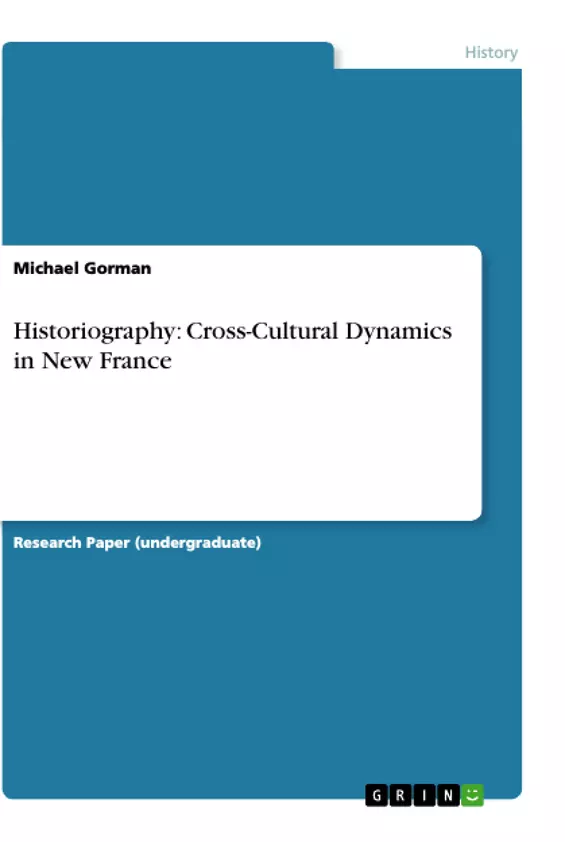A historiography (or history of historical research) on the relationship between the French colonial powers and Amerindian powers of the Great Lakes region, Upper Canada, and northeastern United States. Spanning several centuries of research, this historiography covers the evolution of how the colonial relationship was perceived, altered, and exploited over time.
Inhaltsverzeichnis (Table of Contents)
- Reframing the Indigenous-European Relationship
- Indigenous-European Encounters in the 17th and 18th Centuries: A New Perspective
- The “Middle Ground”: Reconceptualizing Colonial Encounters
- The Interplay of Power: Indigenous Agency and European Influence
- Conclusion
Zielsetzung und Themenschwerpunkte (Objectives and Key Themes)
This work aims to reexamine the cross-cultural encounters between the French and Indigenous peoples in the Great Lakes region of New France during the 17th and 18th centuries, moving beyond traditional narratives of conquest and assimilation. The author challenges the Eurocentric perspective that has dominated historical accounts, highlighting the agency and resilience of Indigenous groups in shaping these interactions.
- The dynamic nature of French-Indigenous relationships
- The role of Indigenous agency and power in shaping colonial encounters
- The development of a “middle ground” where Indigenous and European cultures intersected
- The limitations of traditional narratives of conquest and assimilation
- The impact of cross-cultural interactions on both Indigenous and European societies
Zusammenfassung der Kapitel (Chapter Summaries)
- Reframing the Indigenous-European Relationship: This chapter introduces the historiography of French-Indigenous encounters in the Great Lakes region, arguing for a shift away from traditional narratives that focus on conquest and assimilation. The author highlights the work of scholars like Richard White, whose groundbreaking research re-examined the socio-political relationships between the French, British, Americans, and their Indigenous allies.
- Indigenous-European Encounters in the 17th and 18th Centuries: A New Perspective: This chapter explores the complex dynamics of French-Indigenous interactions during the 17th and 18th centuries. The author challenges the notion that Indigenous peoples were simply passive recipients of European expansion, emphasizing their agency and strategic alliances in shaping these encounters.
- The “Middle Ground”: Reconceptualizing Colonial Encounters: This chapter delves into the concept of a “middle ground,” a space where Indigenous and European cultures intersected and created new forms of social interaction. The author argues that this space was not merely a product of European dominance, but rather a result of mutual accommodation and negotiation.
- The Interplay of Power: Indigenous Agency and European Influence: This chapter examines the interplay of power dynamics between Indigenous groups and European colonists. The author highlights the ways in which Indigenous groups exercised agency and influence, shaping the course of colonial encounters and negotiating their own survival.
Schlüsselwörter (Keywords)
Key terms and concepts explored in this text include: cross-cultural encounters, New France, Great Lakes region, Indigenous agency, middle ground, historical narrative, Eurocentrism, colonialism, social history, and interdisciplinary scholarship.
Frequently Asked Questions
What is the "Middle Ground" in colonial history?
It is a conceptual space where Indigenous and European cultures intersected, leading to mutual accommodation and negotiation rather than just dominance.
How does the author view traditional narratives of New France?
The author challenges Eurocentric perspectives that focus solely on conquest, emphasizing instead the agency and resilience of Indigenous peoples.
Which region is covered in this historiography?
The study covers the Great Lakes region, Upper Canada, and the northeastern United States during the 17th and 18th centuries.
What role did Indigenous agency play in colonial encounters?
Indigenous groups were strategic actors who shaped interactions through alliances and negotiations, influencing the course of colonial history.
Who is Richard White in this context?
Richard White is a key scholar mentioned for his groundbreaking research on the socio-political relationships between Europeans and Indigenous allies.
- Quote paper
- M.A. Michael Gorman (Author), 2021, Historiography: Cross-Cultural Dynamics in New France, Munich, GRIN Verlag, https://www.grin.com/document/1118481



